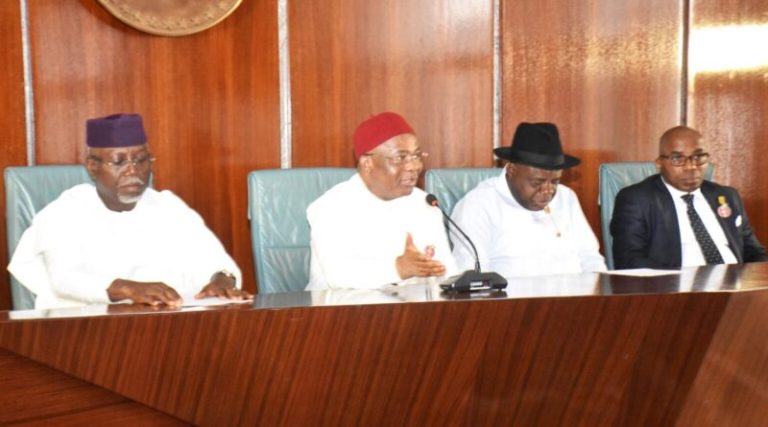•Moves to end incessant grid collapse, constitutes committee on national electrification
The National Economic Council (NEC) has directed Kwara, Adamawa, Kebbi states and the Federal Capital Territory (FCT), Abuja, to submit their positions on the proposed establishment of state police within one week.
Governor Douye Diri of Bayelsa said this while briefing newsmen at the end of the NEC meeting chaired by Vice-President Kashim Shettima, at the Presidential Villa, Abuja, yesterday.
He explained that the council was updated on the establishment of state police and it was reported that 33 states have submitted their positions.
“Three states are yet to do so. These three states are Adamawa, Kebbi, and Kwara, plus the FCT, Abuja. The council mandated these remaining states and FCT to make their submissions within the next one week and reserved to present a consolidated state position on state police to the National Economic Council at our next meeting.”
Governor Hope Uzodimma of Imo State said the council also received a presentation from the National Coordinator of the Special Agro Industrial Processing Zone (SAIPZ). “Of course, you will recall that this is a special agricultural programme by the Federal Government and the African Development Bank. The pilot states are Kano, Kaduna, Kwara, Oyo, Ogun, Imo, Cross River, and the FCT, under phase one. And the projects in these states are at various stages of completion. Impressed by the programme, phase two is about to start. Two weeks ago, there was a stakeholders’ meeting that brought additional 21 states.”
Uzodimma said the council resolved that all the states of the federation should key into the programme, saying, “this programme is going to be a game changer. And it will help in tackling the food security drive by the Federal Government.”
He said the council also received a presentation from the National Agency for Science and Engineering Infrastructure (NASENI).
“They presented various initiatives of the agency; in agriculture, science, technology, and proposed partnership with sub-national governments on the establishment and improvement of solar power, rural electrification and some other industries.
“And the agency wants to support manufacturing and seaport development. They are also going to make land accessible, encourage the public sector market and general infrastructure. As a matter of fact, they came up with different initiatives, repairing agro equipment and implementing, repairing and manufacturing tractors to be powered by solar,” he said.
Uzodimma, therefore, said the council urged NASENI to help state governments in repairing the broken down tractors in different states. “Impressed by that, most of the sub-nationals have expressed willingness to henceforth partner, procure and patronise NASENI in making sure that all these efforts and initiatives come to fruition.”
The NEC has also constituted a committee on national electrification to deepen states’ engagement within the Electricity Reform Act, 2023, and the National Electricity Strategy and Implementation Plan.
Governor Lucky Aiyedatiwa who briefed newsmen, named Governor Bassey Otu of Cross River as Chairman of the committee, Governor Dikko Radda and Governor Inuwa Yahaya of Katsina and Gombe states, respectively, as members.
He said other members were the governors of Osun, Imo and Plateau states and the Minister of Finance and Coordinating Minister of the Economy. He said the Minister of Budget and Economic Planning, Minister of Power and Special Adviser to the President on NEC and Climate Change, were also members of the committee.
He also listed other members to include the Special Adviser to the President on Power, the Managing Director, Rural Electrician Agency and the Managing Director, Nigeria Delta Power Holding Company.
The governor explained that the committee’s terms of reference have to do with deepened states’ involvement with a view to taking advantage of the Act.
Aiyedatiwa said the Managing Director, Rural Electrification Agency, briefed the council on the impact of the agency’s activities in providing rural electrification to institutions, healthcare facilities and business settings in the country.
He said the council resolved that Nigeria needs to reform and diversify the electricity system apart from the one from the national grid.
He added that the council further observed that by empowering states, accessibility and affordability of electricity would ensure that all regions effectively meet their specific energy needs.
